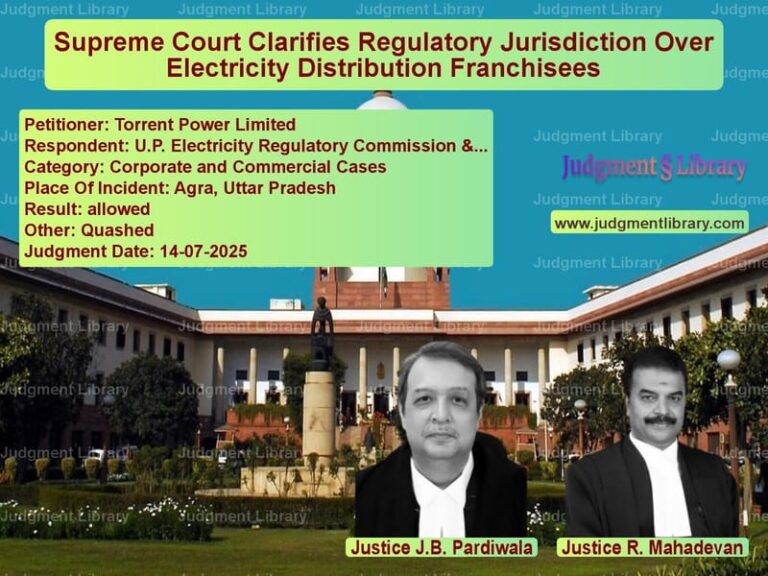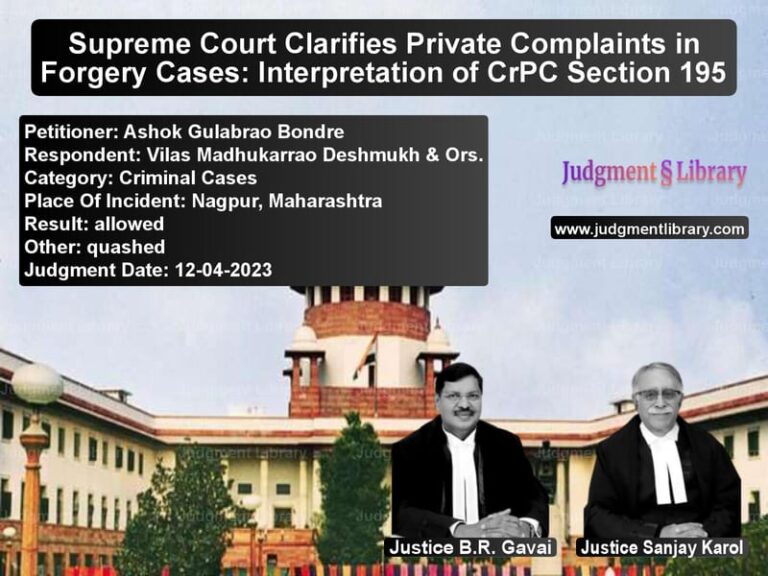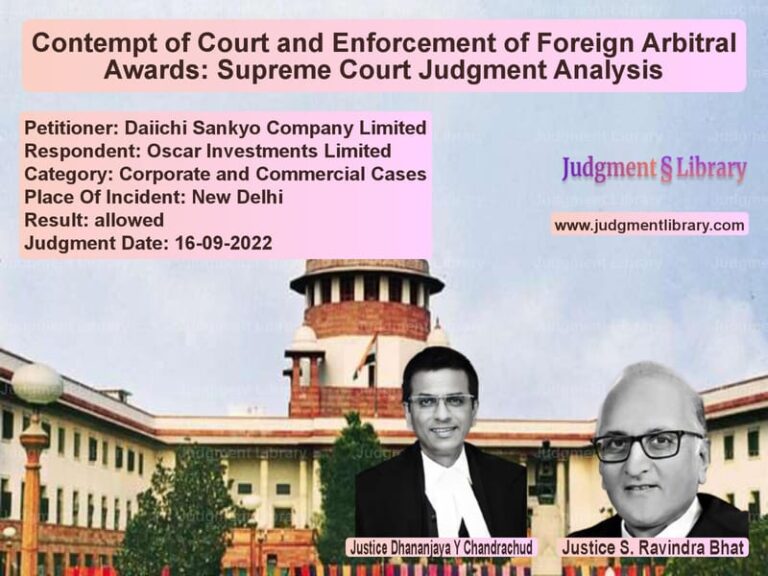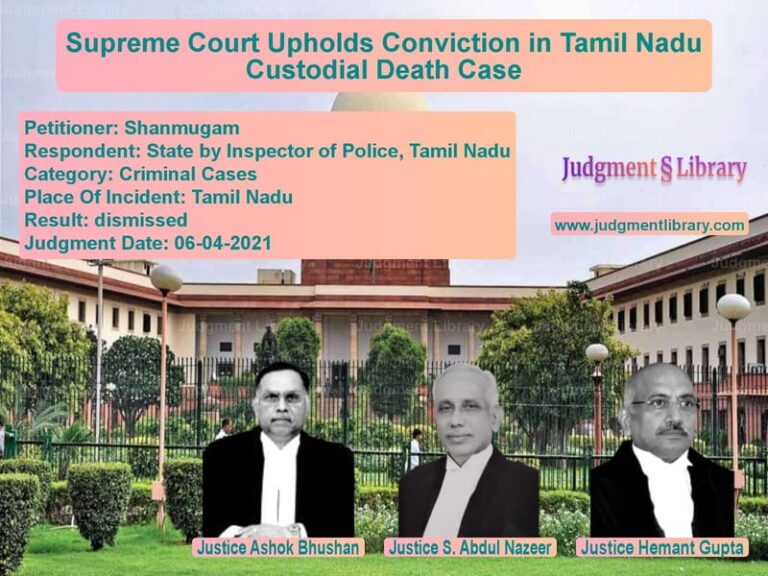Exhumation and Religious Rights: Mohammad Latief Magrey vs Union Territory of Jammu and Kashmir
The case of Mohammad Latief Magrey vs Union Territory of Jammu and Kashmir involves significant issues surrounding the right to a decent burial and the exhumation of bodies. The case is centered on the appellant, Mohammad Latief Magrey, seeking the exhumation of his son’s body after he was killed in an encounter between militants and police in 2021. The petitioner’s son, Amir Latief Magrey, was killed during the encounter, and his body was buried by the authorities in a graveyard. The petitioner sought to perform the religious rites of his son according to his traditions, claiming that the right to perform the last rites was a fundamental right under Article 21 of the Constitution of India. This case brings to light the conflict between personal rights, religious practices, and public order in India.
Background of the Case
The petitioner’s son, Amir Latief Magrey, was killed on November 15, 2021, during an encounter between militants and the police in the Hyderpora area of Kashmir. The police registered an FIR in relation to the encounter, and the bodies of the militants, including Amir, were recovered and sent for post-mortem. While two of the bodies were exhumed and handed over to the relatives for last rites, Amir’s body was buried without his family’s consent. The appellant, the father of the deceased, was informed about his son’s death and went to Kashmir to claim the body. However, his request for the return of his son’s body was denied. This denial led to the filing of a writ petition by the appellant before the High Court, which sought permission for the exhumation of the body for the purpose of performing the last rites.
The Petitioner’s Arguments
The petitioner argued that as a father, he had the fundamental right to perform the last rites of his son in accordance with the religious traditions and faith that the deceased had followed during his lifetime. He contended that the right to a decent burial and to perform last rites is part of the fundamental right to life and liberty guaranteed under Article 21 of the Constitution of India. The petitioner further argued that the denial of this right to him and his family members was arbitrary and in violation of their constitutional rights.
In support of his arguments, the petitioner referred to various legal precedents, including decisions that recognize the dignity of the deceased as an extension of the right to live with dignity. He also emphasized that the body had been buried with respect and in accordance with the religious practices of the deceased. However, the petitioner believed that due to the special circumstances of the case, including the son’s death in an encounter, the family should have the right to perform the last rites as per their religious customs.
The Respondent’s Arguments
The respondents, represented by the Union Territory of Jammu and Kashmir, argued that the exhumation of the body was not feasible due to public order concerns. The respondents claimed that the body had been buried in accordance with Islamic practices and that the exhumation could lead to public unrest and security issues. They also referred to the fact that the deceased had been involved in militant activities, and the exhumation could lead to the glorification of terrorism and disturb public order.
The respondents also highlighted the risks of public health and hygiene in exhuming a body that had been buried for more than eight months. The respondents contended that the body might have decomposed to a state that could pose a risk to public health. Furthermore, they pointed out that the exhumation of bodies in such cases was not a usual practice and could set a dangerous precedent for similar requests in the future.
The Court’s Analysis
The Supreme Court’s analysis centered around the balance between the fundamental rights of the petitioner under Article 21 and the need to maintain public order. The Court recognized that the right to dignity and the right to practice one’s religion, including performing the last rites of a deceased relative, were fundamental rights. The Court also acknowledged that these rights extended to the deceased, who should be treated with respect and dignity after death.
However, the Court noted that the exhumation of bodies, particularly in the context of a militant’s death, is a sensitive issue that involves public order concerns. The Court emphasized that while the fundamental rights of the appellant and his family were important, they must be balanced against the security concerns raised by the respondents. The Court also considered the fact that the body had been buried for several months, and the health risks associated with exhumation were a significant factor in their deliberations.
The Court examined whether the denial of the appellant’s request to perform the last rites violated his fundamental rights. It held that while the petitioner had a right to dignity and the right to perform the last rites, these rights were not absolute and could be subject to reasonable restrictions, particularly in cases where public order and security were at stake.
Final Judgment
The Supreme Court ruled that the appellant had a right to perform the last rites of his son, as this was part of the fundamental right to life and dignity under Article 21 of the Constitution. However, the Court also recognized the public order concerns and the potential risks to public health associated with the exhumation of the body after several months. The Court ordered that the appellant be allowed to perform Fatiha Khawani (prayers after burial) at the Wadder Payeen Graveyard, subject to security arrangements being made by the respondents.
The Court also upheld the compensation of Rs. 5 lakh awarded by the High Court to the appellant for the emotional and sentimental harm caused by the denial of the right to perform the last rites. The compensation was deemed appropriate given the unique circumstances of the case and the emotional distress suffered by the appellant and his family.
Significance of the Judgment
This judgment is significant because it reaffirms the importance of respecting the rights of individuals to perform religious rites and maintain dignity, even in the context of a deceased person who may have been involved in militant activities. The Court balanced the constitutional rights of the appellant with public order considerations, providing a nuanced approach to the issue of exhumation and religious practices. The judgment also highlights the evolving legal approach to human dignity and the rights of family members to carry out the last rites of their loved ones in accordance with their faith and traditions.
Petitioner Name: Mohammad Latief Magrey.Respondent Name: Union Territory of Jammu and Kashmir.Judgment By: Justice Surya Kant, Justice J.B. Pardiwala.Place Of Incident: Jammu and Kashmir, India.Judgment Date: 12-09-2022.
Don’t miss out on the full details! Download the complete judgment in PDF format below and gain valuable insights instantly!
Download Judgment: mohammad-latief-magr-vs-union-territory-of-j-supreme-court-of-india-judgment-dated-12-09-2022.pdf
Directly Download Judgment: Directly download this Judgment
See all petitions in Fundamental Rights
See all petitions in Constitution Interpretation
See all petitions in Judgment by Surya Kant
See all petitions in Judgment by J.B. Pardiwala
See all petitions in dismissed
See all petitions in Modified
See all petitions in supreme court of India judgments September 2022
See all petitions in 2022 judgments
See all posts in Constitutional Cases Category
See all allowed petitions in Constitutional Cases Category
See all Dismissed petitions in Constitutional Cases Category
See all partially allowed petitions in Constitutional Cases Category







